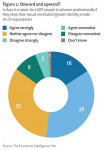Japan’s M&A market will slowly close gap with other major economies, says new Economist Intelligence Unit report
Mergers and acquisitions (M&A) activity in Japan has accelerated in recent years, yet in comparative terms Japan’s M&A market remains small: completed deals were equivalent to just 2% of GDP in 2006, far below similar developed economies. Will M&A in Japan ever catch up with the levels of activity seen elsewhere? Closing the gap? The outlook for M&A in Japan concludes that although not all the preconditions that prompted M&A waves in other markets (specifically the US) are evident in Japan, M&A activity is likely to continue to accelerate·if not perhaps in the fashion seen elsewhere.
Changes to the corporate code that ease restrictions on how M&A deals are structured, and new corporate-governance regulations that will put pressure on auditors and challenge managers to ameliorate the risks in their conglomerates, will reinforce this trend. Yet activist-investor aggression and foreign acquisitions will remain by far the minority. M&A activity will accelerate, but it will continue to be focused on domestic, friendly, inter-and intra-group transactions.
The report’s key findings include:
· Small, domestic deals still dominate Japan’s M&A market
Despite the attention given to major deals like Softbank-Vodafone or Citibank-Nikko Cordial, the fact is that one-third of all M&A transactions in Japan are in the mid-market range of US$500m or less. Moreover, 80% of all deals since 2000 have involved an unlisted target firm. Large firms and their divisions are rarely the targets for M&A deals·reinforcing the perception that size is a form of protection, and by extension managers’ unwillingness to sell off peripheral business lines to focus on core revenue streams.
· Some preconditions for an M&A wave are evident in Japan…
As in the US prior to the M&A wave of the 1980s, some preconditions for conglomerate destruction and industrial restructuring are in place: Japanese firms are feeling the heat from competitors abroad, pension funds and other institutional investors recognise that they need far higher returns from their capital, and the economic benefits of M&A transactions are documented and understood, even by potential targets.
· …but sufficient power has not yet shifted to investors
Unlike in the US, there has been no comparable shift to reorganise Japanese companies from manager- to investor-controlled entities. Japanese managers do not typically receive equity as compensation, so their interests are not aligned with those of investors. As recent shareholder meetings illustrate, Japanese investors have become more active, but a lack of information about managers’ performance, and a lack of managerial accountability, have restricted their leverage. Managers remain unwilling to sell; poison pills, in place in over 10% of listed firms, mean managers can still decide whether or not to accept a bid.
· Revisions to the corporate code are unlikely to prompt an M&A wave…
It seems unlikely that recent revisions to the corporate code allowing stocks to be used for consideration in M&A deals will lead to a wave of hostile takeovers, as some had feared. Minority shareholders can reject “triangular merger” squeeze-out bids as too low if they do not price in intangibles like projected synergies, and restrictions on tax deferral make such deals (at least for foreign firms) less viable.
· …but triangular mergers might promote intra-group M&A
Tax-deferral regulations favour intra-group M&A, allowing parent companies to protect proprietary technology and supply chains by increasing holdings in their subsidiaries (as seen recently in the auto, oil and steel sectors). Intra-group M&A account for more than 30% of total domestic M&A activity. The high level of cross-shareholdings (which still account for one-fifth of all listed shares) and the low debt-equity ratios of many firms suggest this trend will continue.
· New corporate-governance rules will give investors more power
Given Japan’s dearth of qualified auditors, weak oversight bodies and a lack of independent boards, managers have often escaped accountability for weak performance, while investors often have been kept in the dark about fraud. The introduction of Japan’s equivalent Sarbanes-Oxley legislation (J-SOX) next year could change this, arming investors with more accurate information and differentiating between well-managed and poorly-managed firms.
· Deals involving foreign buyers will remain limited
Despite headline-grabbing deals like those pursued by Steel Partners, foreign acquisitions of Japanese firms will remain limited (not least because many strategic buyers are looking elsewhere, particularly India and China, for more alluring targets). Nonetheless, high-profile deals by financial players like Steel will be instrumental in exposing managerial weakness·and will continue to send potential targets racing for “white knights”, leading to industry consolidation. Observers of the Japanese market think financial buyers will have to take a less aggressive approach, focused on minority-stake investments.
· “Face-saving” M&A will continue to dominate the market
Domestic and foreign acquirers will continue to have to tread carefully, eschewing aggressive Anglo-American strategies in favour of a more consensual approach to obtain management buy-in. Even tender-offer bids are only likely to succeed if the target managers approve.
Ultimately, although it will continue to grow, the M&A market in Japan is unlikely to do so along the lines seen elsewhere. As the differentiation between well-managed and poorly-managed firms becomes more pronounced, so investors will be able to impose their will more easily. Generational change, in particular the training of a new wave of executives with Anglo-American-style managerial skills, will make its mark in due course. In the short-to-medium term, however, M&A transactions in Japan will remain distinctively Japanese.
* Closing the gap? The outlook for M&A in Japan is sponsored by Allen & Overy, Daiwa Securities SMBC, Ernst & Young Transaction Advisory Services and Marsh.
* To see the full report, please go to http://www.eiu.com/JapanOutlook.
About the Economist Intelligence Unit
The Economist Intelligence Unit is the world leader in global business intelligence. It is the business-to-business arm of The Economist Group, which publishes The Economist newspaper.
The Economist Intelligence Unit provides geopolitical, economic and business analysis on more than 200 countries, as well as strategic intelligence on key industries and management practices. With over 300 full-time professionals in 40 offices around the world, supported by a global network of more than 700 contributing analysts, the Economist Intelligence Unit is widely known for its unparalleled coverage of major and emerging markets.
웹사이트: http://www.eiu.com
연락처
Edgar Fernandez
Marketing Manager, Asia-Pacific
(852) 2585 3826 이메일 보내기
Fax: (852) 2802 7007
이 보도자료는 Economist Intelligence Unit가(이) 작성해 뉴스와이어 서비스를 통해 배포한 뉴스입니다.




